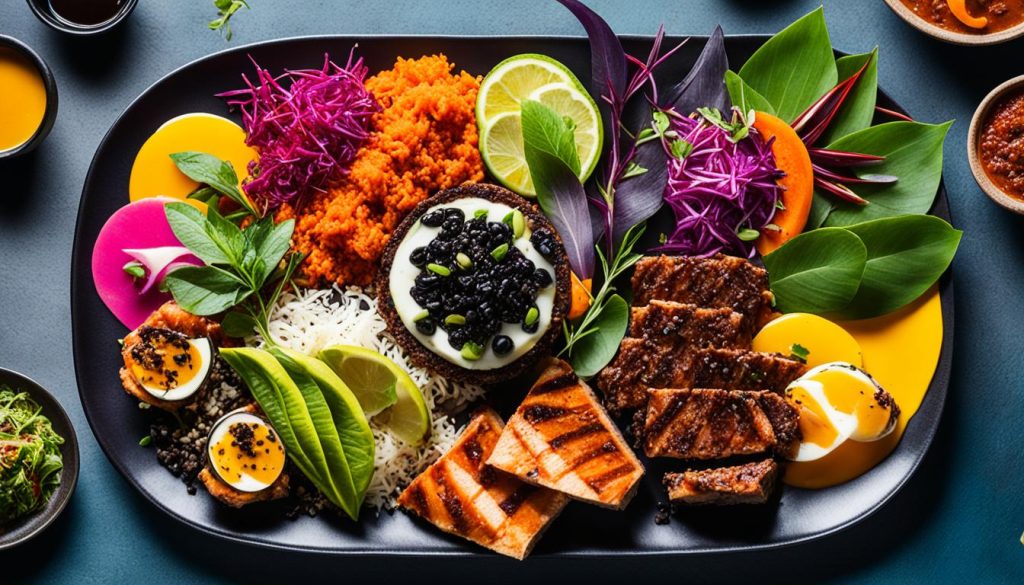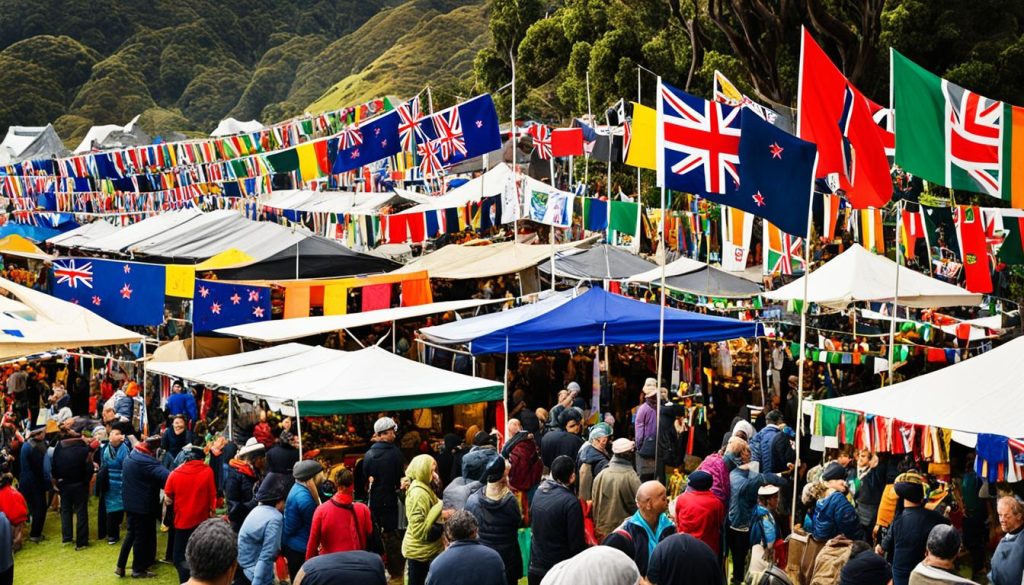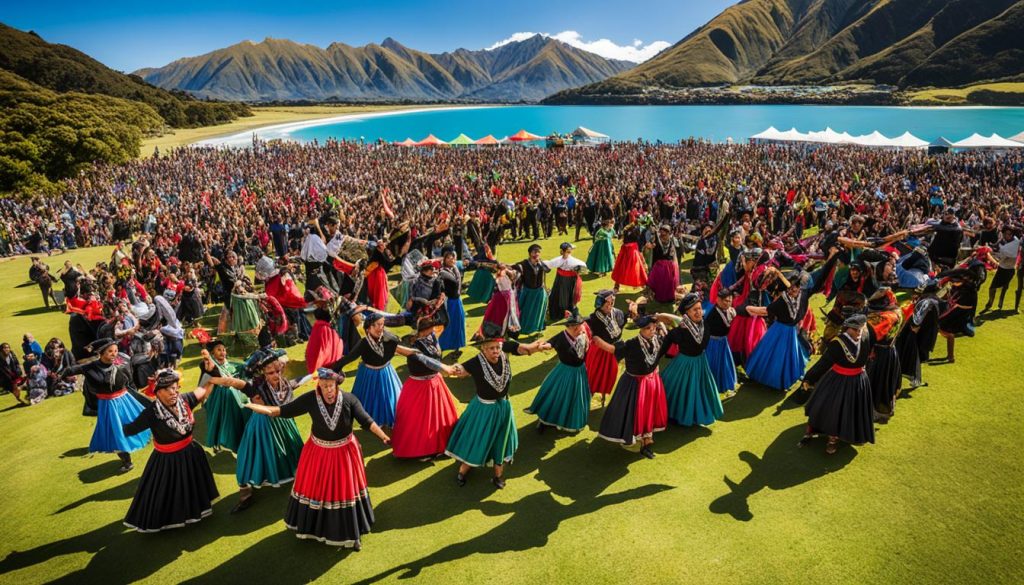New Zealand is a country known for its stunning landscapes, adventure sports, and friendly people. But it is also a country that celebrates and embraces cultural diversity. With a population made up of more ethnicities than there are countries in the world, New Zealand truly represents a vibrant melting pot of traditions.
As a melting pot, New Zealand’s cultural diversity brings numerous benefits to individuals, communities, and businesses. It fosters knowledge, understanding, and creativity, enriching the fabric of society. The unique blend of cultures creates a harmonious and inclusive community where every individual feels valued and celebrated.
Key Takeaways:
- New Zealand is a culturally diverse country, with more ethnicities than there are countries in the world.
- Cultural diversity brings numerous benefits, including knowledge, understanding, and creativity.
- New Zealand’s embrace of cultural diversity sets an example for the world on creating a society that celebrates the richness of cultural heritage.
- The blending of cultures in New Zealand creates a harmonious and inclusive community where every individual feels valued and celebrated.
- Cultural diversity fosters social cohesion and appreciation of different traditions.
The Impact of Cultural Diversity in New Zealand
The multiculturalism in New Zealand has brought about a significant impact on the country’s cultural landscape. With diverse cultures migrating to New Zealand, the country has transformed into a melting pot of traditions, contributing to a vibrant and inclusive society. Immigration policies and pathways have played a crucial role in facilitating the integration of newcomers, resulting in a multicultural nation.
This demographic transformation has had far-reaching effects on New Zealand’s society, fostering knowledge, understanding, and creativity among its people. The blending of different cultural influences has enriched the fabric of the country, leading to positive social and economic outcomes. By embracing cultural integration, New Zealand has created an environment where people from various backgrounds can coexist, share experiences, and collaborate.
Let’s take a closer look at how multiculturalism has influenced New Zealand’s demographics:
| Ethnic Group | Population Percentage |
|---|---|
| Māori | 16.5% |
| European | 70.2% |
| Pacific Islander | 9.2% |
| Asian | 15.3% |
The multicultural nature of New Zealand is evident from its diverse ethnic composition. The Māori, original Polynesian inhabitants, account for 16.5% of the population, contributing to the rich indigenous culture and heritage. Europeans make up the majority, with 70.2% of the population, reflecting the country’s colonial history. Pacific Islanders and Asians also constitute significant proportions, adding to the cultural tapestry of New Zealand.
Through multiculturalism, the people of New Zealand have embraced cultural diversity, leading to a society that celebrates different traditions, languages, and customs. This inclusive approach has not only created a harmonious community but has also resulted in social cohesion and a sense of belonging for individuals from diverse backgrounds.
“The multiculturalism in New Zealand has transformed the cultural landscape, fostering an environment where people can coexist, share experiences, and collaborate.”
Furthermore, the cultural integration in New Zealand has opened doors to new perspectives, ideas, and innovations. By blending different cultural influences, individuals and communities have been able to explore and create unique expressions of art, music, and literature. This cultural fusion has not only enriched the fabric of New Zealand’s society but has also contributed to its creative industries and global reputation.
The impact of cultural diversity in New Zealand goes beyond social and economic aspects. It extends to the culinary scene, cultural festivals, and initiatives promoting cultural mixing. The integration of various cuisines has resulted in a vibrant and diverse food culture, where flavors, ingredients, and techniques from different traditions come together to create innovative and delicious dishes.
Cultural festivals provide a platform for celebrating and showcasing the diverse cultures in New Zealand. Through music, dance, art, and food, these festivals foster a deeper appreciation and understanding of different cultural traditions. They serve as a testament to the power of cultural exchange and the strength of inclusivity in building a cohesive society.
As New Zealand continues to embrace multiculturalism, it sets an example for the world on the possibilities and benefits of cultural integration. By valuing and celebrating diversity, New Zealand creates an environment where individuals from all backgrounds feel accepted, respected, and valued.
The Culinary Fusion of Cultures in New Zealand
The blending of culinary traditions from different cultures has resulted in a vibrant and diverse food scene in New Zealand. The introduction of new ingredients, cooking techniques, and flavors has given rise to fusion cuisine, reflecting the multiculturalism of the country. Popular dishes include Chinese, Indian, European, and Pacific Island influences, creating a unique gastronomic experience.
| Culinary Influence | Example Dish | Description |
|---|---|---|
| Chinese | Kumara and Sweet Onion Spring Rolls | A fusion of Chinese spring rolls and New Zealand’s native sweet potato, kumara, resulting in a delectable combination of flavors and textures. |
| Indian | Lamb Rogan Josh Pie | A twist on the traditional New Zealand meat pie, infusing it with the aromatic spices and rich flavors of Indian cuisine. |
| European | Hāngi Shepherd’s Pie | A fusion of the classic New Zealand dish, shepherd’s pie, with the cooking technique of hāngi, where meat and vegetables are cooked in an earth oven, resulting in a delicious blend of European and Māori flavors. |
| Pacific Island | Taro Coconut Cake | A fusion of New Zealand’s European baking traditions with the tropical flavors of the Pacific Islands, creating a moist and flavorful cake made with taro root and coconut. |

Cultural Festivals in New Zealand
One of the most vibrant ways to experience the rich cultural diversity of New Zealand is through its cultural festivals. These celebrations provide a platform for showcasing the traditions, arts, and cuisines of different ethnic communities across the country. Through music, dance, art, and food, cultural festivals in New Zealand bring people together, promote understanding, and foster social cohesion.
Among the many cultural festivals in New Zealand, three stand out for their significance and popularity:
Diwali Festival
The Diwali Festival is a joyous celebration of lights and one of the most widely celebrated Hindu festivals in the world. In New Zealand, the festival is marked with colorful cultural performances, traditional dances, and music. The festival creates a vibrant atmosphere where people from all walks of life can come together to appreciate the Hindu culture and its values of family, community, and unity. The aroma of mouthwatering Indian delicacies fills the air, making it an unforgettable experience for all.
Chinese New Year
The Chinese New Year is another significant cultural festival celebrated with grandeur and excitement. It marks the beginning of the lunar calendar and is a time for family reunions, feasting, and exchanging blessings. The festival is characterized by dragon and lion dances, lantern festivals, and fireworks. Chinese communities in New Zealand take great pride in showcasing their rich traditions through elaborate performances and sharing delicious Chinese cuisine with locals and visitors.
Pasifika Festival
The Pasifika Festival is a vibrant celebration of the Pacific Island cultures that have shaped New Zealand’s identity. This festival brings together the diverse communities from Samoa, Tonga, Fiji, Cook Islands, and other Pacific Island nations. With live music performances, traditional dances, arts and crafts exhibitions, and mouthwatering Pacific Island cuisine, the Pasifika Festival offers a unique opportunity for people to immerse themselves in the rich cultural tapestry of the Pacific.
These cultural festivals not only provide a platform for cultural exchange but also contribute to the preservation and promotion of diverse traditions in New Zealand. They play a significant role in fostering a sense of belonging, inclusivity, and appreciation for different ethnicities, ultimately contributing to a stronger and more united nation.
| Festival | Highlights | Date |
|---|---|---|
| Diwali Festival | Cultural performances, traditional dances, music, Indian delicacies | Varies (usually October/November) |
| Chinese New Year | Dragon and lion dances, lantern festivals, fireworks, Chinese cuisine | Varies (usually January/February) |
| Pasifika Festival | Live music performances, traditional dances, arts and crafts, Pacific Island cuisine | Varies (usually March) |
Initiatives Promoting Cultural Mixing Through Food
Various initiatives in New Zealand are dedicated to promoting cultural mixing and understanding through food. These initiatives provide platforms where diverse cuisines, culinary skills, and cultural traditions can be shared and celebrated. Here are some key initiatives that contribute to the vibrant culinary scene and cultural exchange in the country:
Ethnic Food Markets and Food Trucks
One way to experience the diversity of New Zealand’s gastronomic landscape is by visiting ethnic food markets and food trucks. These vibrant marketplaces showcase a wide variety of cuisines from around the world, allowing locals and visitors to indulge in flavors from different cultures. From Indian street food to Italian delicacies, these markets offer a sensory journey that reflects the multiculturalism of the country.
One popular example is the La Cigale French Market in Auckland, where visitors can taste traditional French pastries, cheeses, and other delicacies. Another renowned market is the Christchurch Farmers’ Market, offering a selection of local and international artisanal products.
Cooking Classes and Workshops
Cooking classes and workshops provide opportunities for immigrants and locals to come together and share their culinary skills. These classes allow participants to learn about different food traditions, techniques, and ingredients, fostering cultural exchange through the universal language of food. Whether it’s mastering the art of making sushi, exploring Indian spices, or learning traditional Māori cooking methods, these classes encourage individuals to appreciate and embrace the cultural diversity of New Zealand’s culinary heritage.
Culinary Collaborations
Culinary collaborations between chefs from different cultural backgrounds are another exciting way to merge culinary traditions and create unique dining experiences. These collaborations blend flavors, techniques, and ingredients from various cultures, resulting in innovative and dynamic dishes. These collaborations not only showcase the creativity and skills of the chefs involved but also offer customers a chance to savor a fusion of tastes that reflects the cultural melting pot.
Collaborations like the Kai Pasifika project, which brings together Pacific Island and Māori chefs, exemplify the power of cultural mixing in the culinary world. These collaborations not only promote inclusivity but also serve as a bridge between different communities, fostering a deeper understanding of cultural heritage through food.

The initiatives promoting cultural mixing through food in New Zealand create a rich and diverse culinary landscape, where flavors, traditions, and stories come together. Whether it’s exploring the tempting stalls of an ethnic food market, learning new cooking techniques, or enjoying the innovative creations of collaborative chefs, these initiatives celebrate the beauty of cultural diversity through the universal language of food.
Challenges and Considerations of Cultural Mixing
While the blending of cultures through cultural mixing brings numerous benefits, it is important to acknowledge and address the challenges that arise in this process. Two significant considerations that arise are language barriers and the preservation of cultural integrity. Let’s delve deeper into these considerations:
Language Barriers: Overcoming Communication Challenges
Effective communication is crucial for meaningful cultural mixing. Language barriers can hinder understanding and limit interaction between individuals from different cultural backgrounds. To foster inclusivity and facilitate communication, efforts should be made to provide language support to those who face language barriers.
“Language is the road map of a culture. It tells you where its people come from and where they are going.” – Rita Mae Brown
Language support initiatives can include language learning programs, translation services, and bilingual resources. By bridging the language gap, we can promote better understanding, connection, and collaboration among individuals from diverse cultures.
Preservation of Cultural Integrity in Fusion Cuisine
Fusion cuisine, which combines culinary traditions from different cultures, is a delightful result of cultural mixing. However, it is crucial to strike a balance between innovation and the preservation of cultural integrity. While experimenting with new flavors and techniques, it is essential to respect and honor the authenticity of traditional dishes.
In preserving the roots of each culinary tradition, we can ensure that the unique flavors and cultural significance are maintained. This allows individuals from various cultural backgrounds to share their culinary heritage and contribute to the vibrant food scene of New Zealand.
To illustrate the importance of preserving cultural integrity, consider the example below:
| Traditional Dish | Fusion Variation |
|---|---|
| Sushi (Japanese) | Sushi Burger (Japanese fusion with Western touch) |
| Authentic Mexican Tacos | Korean BBQ Tacos (Mexican-Korean fusion) |
| Butter Chicken (Indian) | Butter Chicken Pizza (Indian fusion with Italian influence) |
These examples show the innovative twists that fusion cuisine brings, while still honoring the traditional dishes. By embracing cultural integrity in fusion cuisine, New Zealand can create culinary experiences that bridge cultures and delight food enthusiasts.
In conclusion, while cultural mixing offers numerous benefits, addressing challenges such as language barriers and preserving cultural integrity is essential. By prioritizing effective communication and respecting the roots of each culinary tradition, we can create a harmonious environment that celebrates cultural diversity and encourages meaningful connections.
The Power of Cultural Mixing in New Zealand
Cultural mixing in New Zealand through immigration has transformed the country into a society that celebrates diversity and promotes inclusivity. The exchange of cultures and the meaningful connections formed have led to the development of a strong sense of social cohesion. Shared meals, culinary experiences, and cultural events have become powerful tools for bridging gaps and fostering a greater understanding and appreciation of different traditions.
New Zealand’s embrace of cultural diversity sets an extraordinary example for the world, showcasing how a nation can draw strength and enrichment from its multicultural landscape. The country’s commitment to inclusivity creates an environment where individuals from diverse backgrounds feel valued and accepted, contributing to a harmonious society.
Shared Meals: A Gateway to Cultural Exchange
Food has always played a significant role in bringing people together, and in New Zealand, it serves as a gateway to cultural exchange. The vibrant culinary scene represents the fusion of various traditions, reflecting the multiculturalism of the country. From bustling food markets to restaurants offering diverse cuisines, New Zealand provides opportunities for locals and immigrants alike to connect through food, creating shared experiences that transcend cultural boundaries. These interactions not only deepen cultural understanding but also promote inclusivity and appreciation for different culinary traditions.
Cultural Events: Celebrating Diversity and Unity
Cultural events in New Zealand serve as platforms for celebrating diversity while fostering unity among different communities. Festivals like the Diwali Festival of Lights, Chinese New Year celebrations, and the Pasifika Festival bring together people of various backgrounds to showcase and experience different cultural traditions. The vibrant displays of music, dance, and art create an atmosphere of inclusivity, where everyone can join in the festivities regardless of their cultural heritage. These events promote social cohesion by encouraging interaction and dialogue among diverse groups, ultimately contributing to a stronger and more connected society.
“New Zealand’s embrace of cultural diversity sets an extraordinary example for the world, showcasing how a nation can draw strength and enrichment from its multicultural landscape.”
Fostering Inclusivity: Bridging Differences, Building Connections
The power of cultural mixing in New Zealand lies in its ability to foster inclusivity. It creates spaces where individuals from different backgrounds can come together, share their stories, and build meaningful connections. By dismantling barriers and promoting cultural exchange, New Zealand cultivates a sense of belonging and acceptance. Through inclusivity, the country demonstrates the profound impact that embracing diversity can have on shaping a united and vibrant society.
New Zealand’s commitment to cultural exchange, inclusivity, and social cohesion serves as an inspiration to the world. By celebrating and embracing the richness of cultural diversity, the country serves as a model for how societies can thrive when diverse voices and traditions are valued and respected. Through shared meals, cultural events, and a genuine commitment to inclusivity, New Zealand continues to build a stronger, more harmonious nation that cherishes the power of cultural mixing.
NZ Melting Pot: Fostering Unity and Inclusivity
NZ Melting Pot is an Auckland-based community organization that plays a crucial role in bringing together diverse cultures in New Zealand. Through their various programs and initiatives, they are dedicated to fostering unity and inclusivity among individuals from different backgrounds.
At NZ Melting Pot, we understand the challenges that newcomers and immigrants face when integrating into a new environment. Our mission is to provide support and resources that enable a seamless transition into the vibrant mainstream culture of New Zealand. We believe that by embracing our differences and celebrating our shared values, we can build a stronger and more cohesive community.
Our Programs and Initiatives
Through our community organization, we offer a range of programs and initiatives designed to empower individuals and bridge cultural gaps. Some of our key initiatives include:
- Language and Cultural Exchange: We organize language classes and cultural exchange programs that allow individuals to learn from each other and develop a deeper understanding of different cultures.
- Volunteer Opportunities: We provide volunteering opportunities that enable individuals to contribute to their community while building meaningful connections with people from diverse backgrounds.
- Community Events: We organize community events that celebrate cultural diversity, fostering a sense of belonging and promoting cross-cultural interactions.
- Support Services: We offer various support services, such as mentoring, counseling, and guidance, to help individuals overcome challenges and thrive in their new environment.
Through these initiatives, we strive to create an inclusive and harmonious community where every individual feels valued and supported.
Volunteering and Fundraising
Volunteering and fundraising play a vital role in supporting our mission at NZ Melting Pot. By volunteering your time and skills, you can make a meaningful impact in the lives of individuals who are navigating their journey in a new country. Your support allows us to continue providing valuable programs and services to our community.
If you would like to contribute to our cause, you can participate in our fundraising efforts. Every donation makes a difference and helps us expand our reach, ensuring that more individuals can benefit from our programs and initiatives.
Join us at NZ Melting Pot and be part of a community that celebrates diversity, fosters unity, and promotes inclusivity.
Conclusion
Cultural diversity in New Zealand brings numerous benefits to individuals, communities, and businesses, fostering knowledge, understanding, and creativity.
The blending of cultures through food, cultural festivals, and initiatives promotes social cohesion and appreciation of different traditions.
NZ Melting Pot is dedicated to creating a harmonious and inclusive community, where every individual feels valued and celebrated.
New Zealand’s embrace of cultural diversity sets an example for the world, creating a society that celebrates the richness of cultural heritage and strives for an inclusive community.
FAQ
How has cultural diversity impacted New Zealand?
Cultural diversity has enriched New Zealand’s society and led to positive social and economic outcomes. It has fostered knowledge, understanding, and creativity, benefiting individuals, communities, and businesses.
What is the culinary scene like in New Zealand?
The culinary scene in New Zealand is vibrant and diverse, reflecting the multiculturalism of the country. Fusion cuisine, influenced by Chinese, Indian, European, and Pacific Island traditions, offers a unique gastronomic experience.
What role do cultural festivals play in New Zealand?
Cultural festivals provide a platform for celebrating and showcasing diverse cultures in New Zealand. These events, featuring music, dance, art, and food, foster social cohesion and appreciation of different cultural traditions.
What initiatives promote cultural mixing through food in New Zealand?
In New Zealand, there are initiatives such as ethnic food markets, cooking classes, and culinary collaborations that encourage cultural mixing through food, allowing immigrants and locals to share their culinary skills and promote diversity.
What are the challenges of cultural mixing in New Zealand?
Language barriers can hinder effective communication and understanding. Efforts to provide language support can help overcome these challenges. It is also important to balance innovation in fusion cuisine while preserving the authenticity of traditional dishes.
How does cultural mixing contribute to social cohesion in New Zealand?
Cultural mixing in New Zealand fosters social cohesion by creating meaningful connections and shared experiences. The power of cultural exchange is evident in the celebration of diversity, shared meals, and participation in cultural events.
What does NZ Melting Pot do to promote unity and inclusivity in New Zealand?
NZ Melting Pot is a community organization dedicated to fostering unity among the diverse cultures in New Zealand. They offer various programs and initiatives to assist newcomers and immigrants in integrating seamlessly into New Zealand’s vibrant mainstream culture.
What are the benefits of cultural diversity in New Zealand?
Cultural diversity brings numerous benefits, including fostering knowledge, understanding, and creativity. It celebrates the richness of cultural heritage and promotes an inclusive community where every individual feels valued and celebrated.

